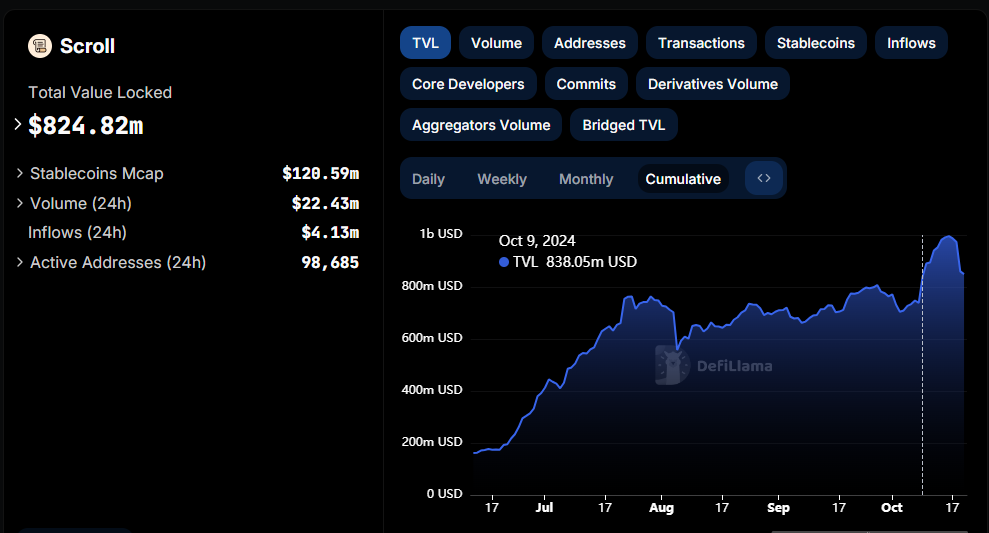Scroll Airdrop Farming Unwinds With $170 Million TVL Drop
Ethereum Layer-2 (L2) network Scroll has experienced a significant drop in its total value locked (TVL). It shed $170 million since its peak on October 16, 2024.
The rise and fall of Scroll’s TVL is emblematic of a broader trend in the crypto space. Short-term incentives such as airdrops can drive rapid growth in TVL but may not foster lasting user engagement.
Scroll TVL Nosedives As Airdrop Farmers ExitScroll’s total value locked (TVL) surged ahead of its highly anticipated snapshot on October 19. The snapshot was part of the protocol’s strategy to distribute its native SCR tokens through an airdrop. As BeInCrypto reported, the announcement on October 9 triggered a rush of activity as airdrop farmers scrambled to boost their holdings in hopes of qualifying for the token rewards.
DefiLlama data shows that between October 9 and October 16, Scroll’s TVL jumped by $157.70 million. It moved from $838.05 million to $995.75, signifying a surge of almost 20% in a week. However, the spike in Scroll’s TVL was short-lived. It has been dropping since the days leading up to the snapshot, recording $824.82 million as of writing.
Read more: What are Crypto Airdrops?
 Scroll TVL Amid SCR Airdrop Hype, Source: DefiLlama
Scroll TVL Amid SCR Airdrop Hype, Source: DefiLlama
TVL refers to the total value of assets locked in a decentralized finance (DeFi) protocol. A surge in TVL usually indicates an increase in the amount of funds deposited and utilized within DeFi platforms. On the other hand, TVL drops indicate a decrease in the amount of assets locked in DeFi protocols.
TVL drops generally point to various reasons like market volatility, changes in user behavior, or events affecting the DeFi space. For Scroll, the rapid drawdown highlights a common issue with airdrop farming. While these events can create short-term liquidity surges, they often do not lead to long-term user engagement or value retention.
Even as the wait for the Scroll airdrop ends, some participants remain dissatisfied. Specifically, some users expressed concerns about insiders unfairly accumulating large amounts of marks.
“Scroll team is so greedy! After allocating 23% to themselves, they also chose to Sybil the airdrop by allocating team addresses 1m+ marks each,” said Anon Vee, a crypto investor and trader on X.
The quick influx of liquidity is typical of airdrop farming, where short-term participants eager to qualify for the airdrop inject capital into the protocol. By temporarily boosting their holdings on the platform, these participants hoped to secure a share of Scroll’s SCR tokens ahead of the airdrop.
Implications of Airdrops For Project LiquidityThe Scroll team appears to have used the airdrop snapshot strategy to attract new users. They leveraged the excitement surrounding such events, as airdrops offer participants the potential to earn free tokens. While some view this as an opportunity to hold assets at the right time, others participate purely for the token distribution without long-term interest in the project.
One downside to this strategy is the dilution of rewards for loyal users. Airdrop farmers, who only add liquidity for a short period, can claim a large portion of the token distribution. This can frustrate long-term supporters who feel their contributions are undervalued.
This issue is not unique to Scroll. Airdrop farming has become common across the crypto space, with projects like Mode Network, Manta, and ZKSync experiencing similar spikes in total value locked before a snapshot, only for the numbers to drop after the farming period ends. This volatility affects project stability and can erode trust among users.
Read more: Best Upcoming Airdrops in 2024
As the trend grows, projects must find ways to design incentive structures that reward long-term commitment without being vulnerable to short-term speculators. The challenge for Scroll and others will be retaining users after the airdrop event ends.
The post Scroll Airdrop Farming Unwinds With $170 Million TVL Drop appeared first on BeInCrypto.
